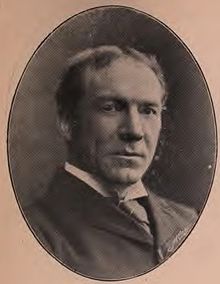Alexander Ure, 1st Baron Strathclyde, GBE, PC (22 February 1853 – 2 October 1928) was a Scottish politician, judge, and georgist land value tax activist.[1]
The Lord Strathclyde | |
|---|---|
 Alexander Ure c. 1895 | |
| Solicitor General for Scotland | |
| In office 1905–1909 | |
| Monarch | Edward VII |
| Preceded by | James Avon Clyde |
| Succeeded by | Arthur Dewar |
| Personal details | |
| Born | 22 February 1853 |
| Died | 2 October 1928 (aged 75) |
| Political party | Liberal |
| Alma mater | University of Glasgow |
Life edit
He was the son of John Ure, lord provost of Glasgow, and his wife Isabella.[2]
He studied law at the University of Glasgow he was admitted to membership of the Faculty of Advocates in 1878.
He was a Liberal Member of Parliament for Linlithgowshire from 1895 to 1913. He became a queen's counsel in 1897.[3]
He provided as solicitor general for Scotland from December 1905[4] to 1909, and as Lord Advocate from February 1909[5] to 1913. He was an enthusiastic supporter of David Lloyd George's 1909–10 budget. He was sworn of the Privy Council in 1909. In 1909, he conducted the prosecution of Oscar Slater for murder; the conviction was later quashed on appeal.
He lived at 31 Heriot Row, a large Georgian townhouse, in Edinburgh's Second New Town.[6]
On leaving Parliament, he was raised to the bench as Lord Strathclyde and appointed Lord Justice General, a post he held until 1920. He was raised to the Peerage as Baron Strathclyde, of Sandyford in the County of Lanark, in 1914. In 1917, he was appointed to the Order of the British Empire as a Knight Grand Cross. He is said to have been skilled in cross-examination, and was more suited to life as an advocate than as a judge.[citation needed]
He retired to his father's house of Cairndhu in Helensburgh in 1920 and died there in 1928. He is buried in Helensburgh Cemetery.[2]
Notable trials edit
Ure famously prosecuted alleged murderer, Oscar Slater, now seen as a serious mistrial. Slater was sentenced to death in 1909. The sentence was commuted to life imprisonment. Following a campaign by Arthur Conan Doyle and others, Slater received a pardon, but only after having served 18 years in Peterhead Prison.[7][8]
Family edit
In 1879, he married Margaret McDowell Steven. Their only child was a daughter, Christobel Helen Ure, who died in 1918, before the Baron's death.
The peerage therefore became extinct on his death.
References edit
- ^ Whitehead, Andrew (1 May 2011). "God Gave the Land to the People: the Liberal 'Land Song'". History Workshop. Retrieved 1 July 2018.
- ^ a b Fullarton, Donald (13 November 2013). "Cairndhu owner became Lord Provost". Helensburgh Heritage. Retrieved 1 July 2018.
- ^ "No. 10915". The Edinburgh Gazette. 3 September 1897. p. 849.
- ^ "No. 11787". The Edinburgh Gazette. 19 December 1905. p. 1313.
- ^ "No. 12118". The Edinburgh Gazette. 19 February 1909. p. 173.
- ^ Edinburgh and Leith Post Office Directory 1905-6.
- ^ Scotland's Murder Mysteries: 4 April 2018.
- ^ The Trial Of Oscar Slater, Wm Roughhead.